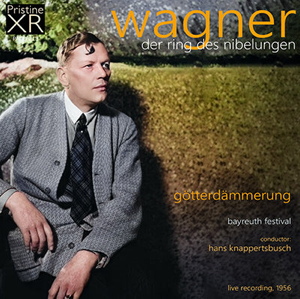
Richard Wagner (1813-1883)
Götterdämmerung
Brünnhilde – Astrid Varnay (soprano)
Siegfried – Wolfgang Windgassen (tenor)
Hagen – Josef Greindl (bass)
Alberich – Gustav Neidlinger (bass-baritone)
Chorus and Orchestra of the Bayreuther Festspiele/Hans Knappertsbusch
rec. live 17 August 1956, Bayreuth, Germany
Score and libretto available as download
Ambient Stereo XR remastering
Reviewed as 24-bit FLAC download
Pristine Audio PACO 213 [4 CDs: 273]
This is the fourth and final instalment in the Bayreuth Ring of August 1956 – and my goodness, you have to admire the stamina and expertise of the artists involved; Astrid Varnay even steps up as Third Norn, having sung Brünnhilde on the two previous nights.
Sonically, the series has been a triumph as a result of Pristine’s remastering. Artistically, the standard is very high; the addition of the great Hermann Uhde as Gunther to an already stellar cast only enhances its appeal. The main drawback to the cycle so far has been the incessant hacking of the audience, only amplified by the sonic refurbishment, but they mostly spare us in the opening scene as the Norns uselessly but dramatically narrate past events. Once again, Jean Madeira is stunningly strong-voiced, and if it is slightly disconcerting to hear Fricka and Brünnhilde as the other two Sisters of Fate, the sheer quality of the voices of Ilosvay and Varnay is ample compensation; this is simply great singing from all three. The climax of the scene when the Rope of Destiny snaps – “Es riß!” – and the sisters descend back to Mother Erda, is riveting.
Then the unbridled coughing starts again, all through the lovely Prelude to “Zu neuen Taten” before the amplitude of the orchestral playing masks it and Astrid has had time for a quick change costume change. She is in great voice, without too much “heaving” or “swooping” and concludes the duet with a ringing top C. Windgassen was never anyone’s ideal of a Wagnerian Heldentenor but he, too, is in good form and I like the spaciousness of Knappertsbusch’s direction; he lets the love music breathe without dragging. Siegfried’s Rhine Journey is take at more of a sedate canter than a gallop but is beautifully played and controlled with plenty of internal swing and momentum. Uhde and Greindl make a well-contrasted pair of half-brothers, the one lighter and leaner of tone and suitably craven, the other dark, lowering and “ugly” in the right way – although his calls of “Hoi-ho!” to Siegfried are clearly a stretch and he can sound clumsy. Just as she was a scintillating Freia and Sieglinde, Gré Brouwenstijn is ideal as a vulnerable, shimmering Gutrune.
The scene where Siegfried disguised by the Tarnhelm as Gunther breaks through the Magic Fire to win Brünnhilde is especially vivid; Varnay’s terror is conveyed through some laser-like top notes and great intensity of expression. We then move on to Neidlinger’s cameo as a matchless Alberich, cajoling his son; listening to this carefully wrought performance reminds me how well Wagner maintains both dramatic tension and musical interest through the whole storyline of this very long work. Once again, the coughing through the orchestral prelude to the “Hagens Ruf” scene is fearsome, however. The chorus of vassals is splendidly animated and their rambunctiousness in combination with Greindl’s crude but effective bellowing drives the action along rousingly. Much is made of Kna’s supposedly leisurely speeds but in fact he takes a mere thirteen minutes longer overall than Krauss in 1953, which is hardly a lot in the context of so long a work – and some consider Krauss too rushed.
A touchstone passage for me in any performance of Götterdämmerung is the oath-swearing trio which concludes the second act – and here it really delivers; scintillating singing and playing from all concerned earning rapturous applause.
The Rhinemaidens’ trio opening the third act is captivating – sometimes even the coughers take a break to listen. Windgassen is understandably occasionally a little dry and strained but by and large copes admirably and is now much more accurate in his beast of a role and makes a fine job of his recollection narrative and death. Kna conducts the funeral march slowly and nobly, rising to a great climax; the trumpet and bank of brass in general are wonderful and again, some of the coughers hold off for a bit. Brouwenstijn, sounding very like Gundula Janowitz, delivers a chilling theatrical scream at the sight of Siegfried’s corpse and Varnay seizes the last of her big moments to sing a searing “Starke Scheite”. She doesn’t have quite the ease and gleam of Kirsten Flagstad, Birgit Nilsson or Rita Hunter – there is a little hooty sliding – but she has enormous heft, warmth and sincerity, and caps a truly commanding performance with her lament. The holocaust of the finale is gripping – breathtakingly grand – and the applause is thunderous.
If you can tolerate the coughing, this Götterdämmerung – indeed the whole cycle – is a magnificent testimony to the marvel that was Knappertsbusch and his team of singers and instrumentalists in Bayreuth in the 1950s, and to the imperishable glory of Wagner’s music.
Ralph Moore
Availability: Pristine ClassicalOther cast members
Gunther – Hermann Uhde (baritone)
Gutrune – Gré Brouwenstijn (soprano)
Waltraute – Jean Madeira (contralto)
Woglinde – Lore Wissmann (soprano)
Wellgunde – Paula Lenchner (soprano)
Floßhilde – Maria van Ilosvay (contralto)
1st Norn – Jean Madeira (contralto)
2nd Norn – Maria van Ilosvay (contralto)
3rd Norn – Astrid Varnay (soprano)


















